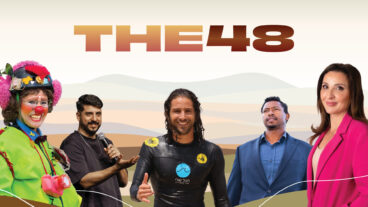“We have no doubt we are in a hot area,” Illy Edry, founder and board member of Poptok.Ohad Jehassi, the VP marketing of Israeli start-up company Poptok gives a sudden loud burst of manic laughter. It comes out as a huge “Woh ho ho ho!” He’s mimicking Dr. Evil in Austin Powers. “How do you spell that exactly?” I ask.
“You can’t, and that’s the point,” says Illy Edry, the company’s founder and board member. “In text you cannot always replicate, or give the same sense of excitement as words or expressions that are spoken. Ohad can say ‘woh ho ho’ to you now, but written in text it just doesn’t have the same impact.”
With this in mind, Poptok hopes to revolutionize the way we express ourselves via the text-based e-mails, or instant messaging that have become our preferred mode of communication today.
The company has developed Internet software that allows users to insert free video clips with the most memorable quotes from big Hollywood movies or music videos into their text to send to friends.
Think King Kong
Instead of dry acronyms like LOL (laugh out loud), or smileys, think Dr. Evil, or King Kong roaring on a hillside. There are thousands of two to five second clips available, from hundreds of movies, allowing users to express an endless array of thoughts or emotions.
What about Al Pacino in Scarface asking “didya finish?”, or Charlie Sheen saying “good morning”. Or Roger Rabbit saying “Pleeeease.” Or just a quote or two from Pulp Fiction. The possibilities are huge. All a user has to do is download a small software application that syncs with email and instant messaging programs. From there, it’s just a case of picking video snippets and dragging and dropping them into text conversations.
“For many years I was working in primetime TV and we’d spend millions on producing programming,” explains Edry, who worked for five years at Keshet Broadcasting, managing content export, and digital media applications. “When viewers gathered around the water cooler the next day, they’d only remember one or two lines from a one-hour show. We thought, let’s take all those beautiful sentences and create a way for people to integrate them into existing communication mediums.”
Poptok, which is now headquartered in New York, with offices in Jerusalem, and California, was founded over a year ago. It was born out of a conversation between Mickey Schulhof, the former CEO of Sony America, and Erel Margalit, the founder of Israeli VC company Jerusalem Venture Partners (JVP). They were discussing ways to combine the Internet with Hollywood film content.
“It was a perfect match, access to Hollywood, combined with access to Israeli innovation,” says Edry, who brought the early ideas to fruition.
Investment of a fairly sizable sum followed from both JVP and Global Technology Investments (GTI), an investment company headed by Schulhof.
Developing the track and search technology was relatively simple compared with getting licenses to use the content. It was Schulhof who opened the doors. “He assisted us in preparing the ground, and setting up meetings with all the major Hollywood film, TV and music studios in order for us to begin licensing with them,” explains Edry.
Partnerships with Hollywood studios
“It was not an easy or short exercise, but one and a half years later we have excellent partnerships with most of the major Hollywood film, TV and music studios,” he adds. These include Universal Pictures, Paramount, Lion’s Gate, CBS, and Warner Brothers.
The 35-employee company launched a private beta site at the end of June, which is available to users by invitation only. So far the company has a few thousand users but it expects these numbers to grow exponentially once it has its commercial launch. “We haven’t started our marketing effort to consumers,” Jehassi explains.
Interest in the company is running high. “Hollywood studios get hundreds and hundreds of offers every year. Everyone wants to cut a deal with them. We are huge within their priorities. They think of us as something that can revolutionize Hollywood in an age of copyright theft,” says Edry.
Some are even calling Poptok the new ring tone of Hollywood because like ring tones, which have introduced a vital new revenue stream to music producers, Poptok offers movie studios a completely new opportunity to monetize existing content and promote new releases.
The video is streamed directly to people’s computers, and none of the data is downloaded or stored by recipients, alleviating concerns over piracy.
The company’s core market is the 13-22 year old age bracket, but Jehassi says there are plans to launch on different platforms including mobile phones and social networks like Facebook, and the demographic will vary as a result.
Company revenue will come from a variety of sources, from the banal – advertising buttons and banners – to sponsorship and promotions from studios hoping to publicize new releases through catch phrases or teaser scenes. There’s also the possibility of e-commerce – click on a movie clip and go straight to Amazon to buy the film, or a cinema to buy tickets.
Collecting eyeballs
“We will be collecting a lot of eyeballs. Given that we know what clips these people are sending, we can target messages and promotions to these individuals,” says Jehassi.
Poptok is now heading for its first round of financing. A new president and CEO, Scott Kauffman has been brought on, and the company is planning to begin a massive marketing campaign.
“We’ve managed to achieve a great deal at turbo rate. It’s phenomenal, in just over a year we’ve developed a company that creates a lot of buzz and interest,” says Edry.
So is he optimistic about the future? “No-one else is doing this at the moment, but I’m not naïve enough to think we will remain alone for a long time,” says Edry. “Somewhere in a garage some place people have probably come up with a similar proposition. It’s not going to be easy for them, however, because it wasn’t easy for us, and we only managed because of Mickey Schulhof. This technology is worthless without the content.
“Let’s take it day by day,” he adds. “We think it’s going to be huge and the market will respond well. Video over the Internet is growing fast, and we have no doubt we are in a hot area, but still we have to do everything right if we want to succeed.”













